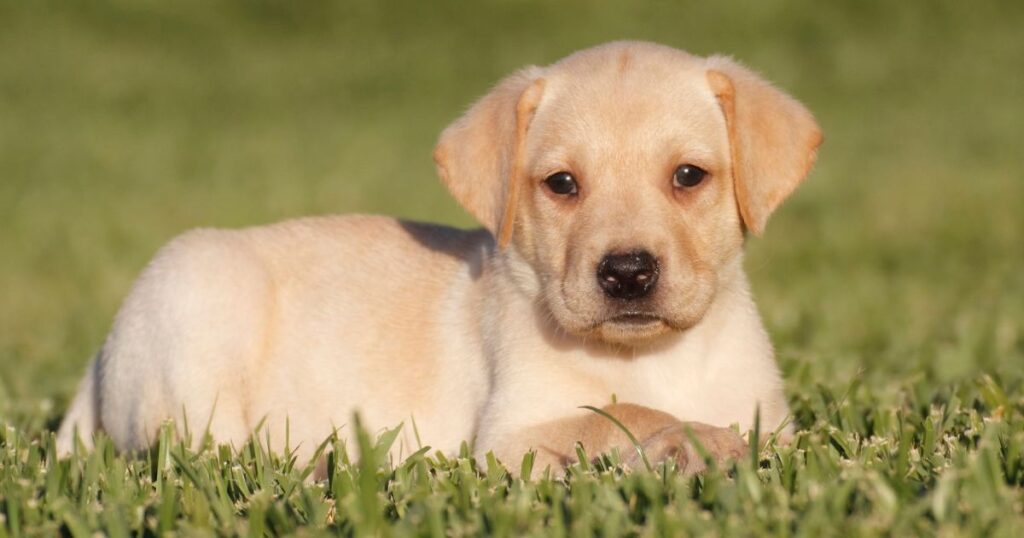
Labrador puppies are well-loved for their playful and loyal demeanor, making them a top choice for families and individuals looking for a furry companion. It is crucial to ensure that these puppies are happy and well-cared for to help them grow into healthy adult dogs. This article will share ten essential tips to raise a joyful and content Labrador puppy, taking into account their unique needs and behavior. One key aspect of a puppy’s happiness is making sure they feel safe and comfortable in their new surroundings. Providing them with a cozy den or crate can fulfill their need for a secure resting place. Creating positive interactions with people, other pets, and different environments early on in a Labrador puppy’s life is also crucial for their social development and confidence. Apart from focusing on their emotional and behavioral well-being, proper physical care such as a balanced diet, regular exercise, and routine healthcare is vital for a puppy’s overall happiness. Stay tuned for the ten tips that will help you in raising a happy and thriving Labrador puppy, because happiness is all about finding the right balance.

A joyful Labrador puppy thrives in an environment that is both safe and calm. To achieve this balance, it is crucial for owners to provide physical and emotional support, in addition to proper training. Maintaining happiness for a Labrador puppy involves a mix of playtime, socialization, and structure. Establishing a routine is a key step in keeping a Labrador puppy content. Consistency in daily activities helps the puppy feel secure and know what to expect. This routine should include regular feeding times, designated playtime, and consistent training sessions. Labrador puppies need mental and physical stimulation throughout the day. Engaging toys like puzzle toys or chew toys can help keep them content and focused. Daily exercise through walks or play sessions is also essential for their well-being. Socialization plays a vital role in a Labrador puppy’s happiness. Exposure to new environments, people, and other dogs helps build confidence and prevents fearfulness later in life. Starting with simple sights and sounds at home and progressing to puppy classes for group interaction is essential for their development. Building a strong bond with the owner is crucial for a Labrador puppy’s happiness. Positive reinforcement, gentle training, and affection help create trust and respect. This connection forms the basis of a rewarding relationship with your loyal companion. Ultimately, keeping a Labrador puppy happy involves providing emotional support, structure, and guidance. This ensures they grow into a well-adjusted and content dog ready to take on the world.
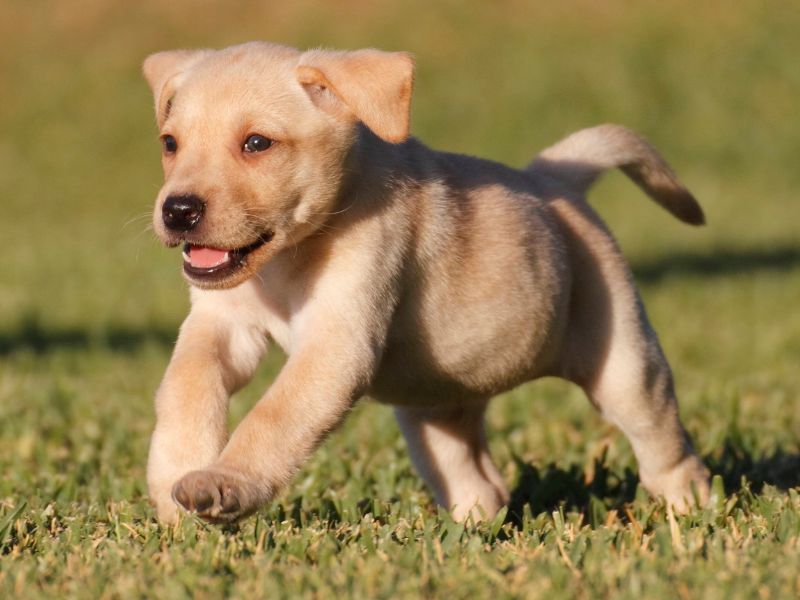
Creating a peaceful environment for your Labrador puppy is crucial for their happiness and overall well-being. Puppies are highly sensitive to the energy and emotions around them, often reflecting the moods of the people and animals in their vicinity. It is common for puppies to become over-excited and exhibit undesirable behavior like excessive biting when the household is chaotic or stressed. Establishing a routine is vital in maintaining a calm atmosphere for your puppy. Puppies thrive on consistency and knowing what to expect. Setting regular meal times, playtimes, rest periods, and maintaining a consistent schedule for potty training can help your puppy feel secure and at ease. Giving your puppy a dedicated safe space within the home is also important. Using a crate or a designated puppy pen can provide a comfortable and secure area for your puppy to retreat to when they need downtime or rest, contributing to their overall sense of calmness. Gradually exposing your puppy to different stimuli in a controlled manner can build their confidence and keep them calm. Introducing them to various sounds, textures, and experiences in a gentle way can help prevent anxiety and overwhelm. Teaching your puppy basic obedience commands and using positive reinforcement can also contribute significantly to a calm environment. Rewarding good behavior with affection, praise, or treats and redirecting negative behavior can help your puppy understand boundaries and expectations, fostering a friendly and supportive atmosphere. By following these tips, you can create a peaceful environment that promotes happiness in your Labrador puppy, allowing them to grow into a well-adjusted and confident adult dog.
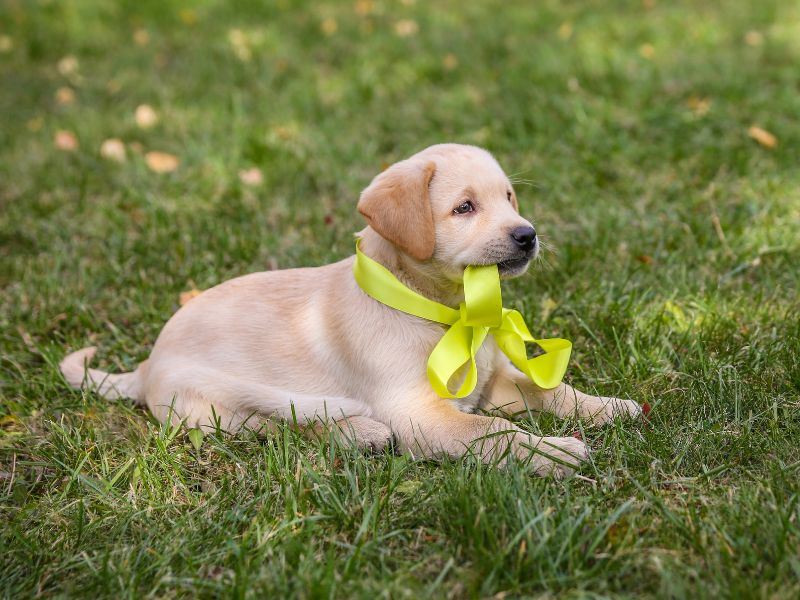
Ensuring a happy Labrador puppy involves creating boundaries within your home to keep them safe and help with training. Providing a designated, cozy space for your puppy to relax, like a crate or confined area, is essential. Gradually allowing your puppy access to more areas as they become more comfortable is important. Using physical barriers like gates and consistent training with positive reinforcement helps them understand boundaries. Keeping a clean and organized home within restricted areas is also crucial for your Labrador puppy’s happiness. Removing hazards and distractions ensures their safety and contentment. By offering a controlled environment, you set your puppy up for success in training and adapting to your home. Establishing a proper feeding routine is vital for your Labrador puppy’s well-being. Providing three measured meals a day at consistent times is recommended. Transitioning to high-quality puppy kibble designed for Labradors is essential as they move from their mother’s milk to solid food. Monitoring portion sizes and adjusting as needed is important to maintain your puppy’s weight and ensure they receive the right nutrients. Offering fresh water throughout the day and maintaining a balanced diet with a consistent feeding schedule are key factors in ensuring the overall happiness and health of your Labrador puppy.

If you’re on the lookout for effective and practical training advice for your Labrador puppy, look no further than Pippa Mattinson. With over four decades of experience in handling dogs, Pippa is an expert when it comes to training Labradors. You can find her insights on various platforms such as The Labrador Site, dogsnet.com, and Labrador Secrets. Pippa emphasizes the importance of creating a calm and stable environment for your Labrador puppy. She suggests providing a safe space for your puppy to feel secure, working on improving your training skills, and focusing on areas like heel work, recall, and avoiding common training mistakes. Pippa’s training resources not only cover the basics of training but also aim to motivate both you and your furry companion for a successful training journey. Best of all, her tips are readily accessible and completely free, making it easy for Labrador puppy owners to access valuable knowledge. By following Pippa Mattinson’s guidance and implementing her training tips with patience, Labrador puppy owners can ensure that their puppies grow up to be happy, well-trained, and well-adjusted dogs. Socialization plays a key role in raising a happy Labrador puppy. By exposing your puppy to various environments, people, and situations early on, you can help them build confidence and adaptability. Start socializing your puppy with the breeder and continue the process as the owner. Make it a goal to introduce your puppy to different places, people, vehicles, and objects before they reach three months old to develop their social skills. Ensure that your Labrador puppy interacts with people of all ages, sizes, and appearances to help them understand that strangers are not to be feared. Keep these interactions positive and safe by rewarding calm behavior with treats, praise, or pets. Taking your puppy to different environments like busy sidewalks, markets, playgrounds, and parks will further aid in their socialization. Encourage calm and well-behaved behavior by praising and rewarding them during these outings. Enroll your Labrador puppy in puppy classes to facilitate safe interactions with other dogs, teaching them essential communication and play skills in a controlled environment. In conclusion, positive reinforcement and socialization are essential components of raising a happy Labrador puppy. By exposing them to diverse experiences and interactions, you can help shape them into confident and well-adjusted adult dogs, leading to a more enjoyable life for both you and your furry friend.
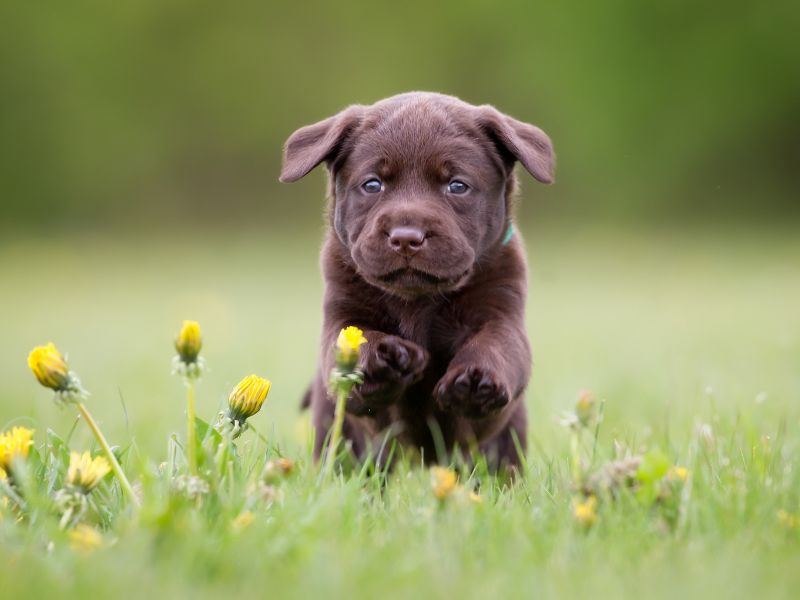
Teaching a Labrador puppy to be happy involves creating a loving and consistent environment through positive reinforcement training. This method, which includes rewards and praise, helps to build a strong bond between owner and puppy. Implementing positive reinforcement training in a Labrador puppy’s daily routine can enhance their overall happiness. By rewarding good behavior with treats or toys, puppies quickly learn what actions lead to positive outcomes, boosting their confidence and well-being. Consistency is key in positive reinforcement training, as puppies thrive on routine. Establishing a regular schedule for feeding, playtime, and training sessions helps puppies feel secure and understand expectations. To effectively use positive reinforcement training, remember to reward good behavior immediately, be patient and consistent with rewards, and engage in regular training sessions to reinforce positive behaviors. By following these tips and maintaining a nurturing approach, Labrador puppies are more likely to be content and well-behaved. Teaching a Labrador puppy to be happy alone is essential for their independence and training progress. Creating a comfortable and safe space for them to be alone, gradually introducing alone time into their routine, and monitoring their reactions will help them build confidence and contentment when separated from their owners. By incorporating positive reinforcement training and teaching Labrador puppies to be happy alone, owners can help them grow into well-adjusted and confident adult dogs. Remember to be patient, consistent, and loving throughout the training process for the best results.
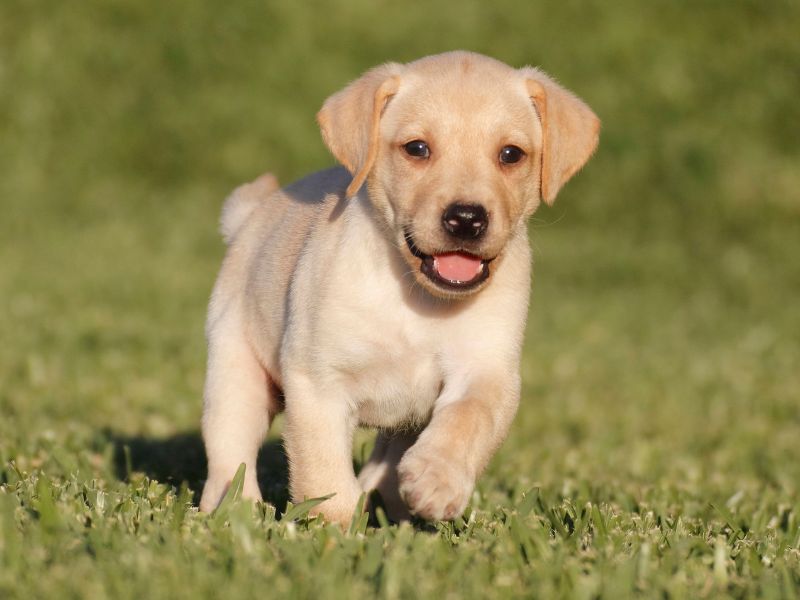
Providing your Labrador puppy with some off-leash time is crucial for their happiness and overall health. It not only gives them mental stimulation but also allows them to explore and exercise. Here are some tips to ensure a safe and fun off-leash experience for your puppy. Training is vital before letting your puppy off the leash. Teach them basic commands and work on a reliable recall. Choose a secure location for off-leash play and always be prepared with essential supplies. Monitor your puppy’s interactions with other dogs and intervene if necessary. Consistency is key in raising a happy Labrador puppy. Establish a routine for meals, walks, and training. Make sure all family members are on the same page with rules and routines. Consistency will help your puppy feel safe, learn good behavior, and develop into a well-adjusted companion. Show your Labrador puppy love and positive reinforcement consistently. Celebrate their progress and be patient as they grow. With a consistent and loving environment, your puppy will thrive and become a well-behaved member of your family.


